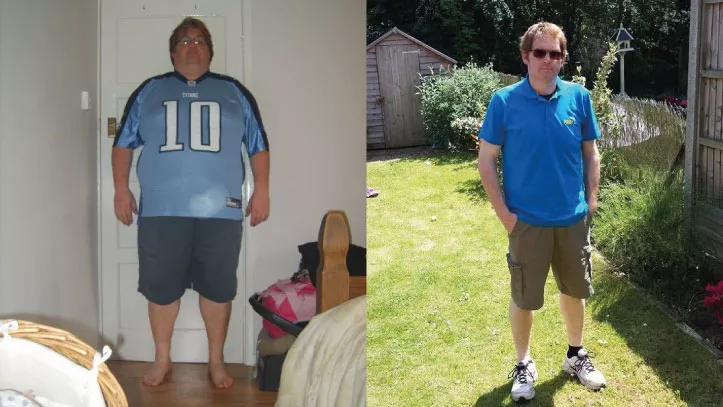
Jason has lost 17 stone and his Type 2 diabetes is in remission after a gastric bypass.
"Congratulations you no longer have Type 2 diabetes." It was a surreal moment when the doctor told me this. Having lived with diabetes in the family for my whole life, my journey from diagnosis of having the condition to having my diabetes go into remission in only a few short years didn’t seem right and I felt both sad that my mother and brother still should live with the condition, but happy while I no longer have to worry about it.
So how did this happen you may ask? Well it may partially be due to genetics as it's been in the family for 3 generations as far as I know, but I suspect my Type 2 diabetes developed because of significant weight gain after university.
"I had reached nearly 30 stone by the age of 30 and had developed several health conditions including Type 2 diabetes. My wife was pregnant with our first child and I knew that I had to do something to reduce my weight and become healthier so I could be a supportive father.”
I tried various ways including diet clubs, medication to lose the weight and regularly exercised but with the diabetes I was struggling to lose a significant amount to make a difference. It was after a routine visit to the doctor that weight loss surgery was suggested. It was not a decision I took lightly, I was referred to a specialist team at the Oxford Centre for Diabetes, Endocrinology & Metabolism (OCDEM), and in 2013 I underwent the procedure. I got lots of support from the Oxford Bariatric Support Group.
For those that don’t know gastric bypass is a procedure where part of the stomach is joined to the small intestine and it’s not without its own risks and complications. The lead up preparation to surgery and post op stages are also challenging but the result is life changing.
Leading up to the operation you are required to stick to what’s called a very low calorie liver reduction diet for a period of two weeks and takes a lot of will power. After the surgery over a period of 8-12 weeks you progress from a liquid diet to solid food. Again, this takes a lot of willpower and is re-learning what you can and cannot eat, as things you once could you may not be able to anymore.

The weight loss is very noticeable and helps keep motivated during the tough times. the months that followed I had dropped on average a stone a month. I was also finding that I was becoming very dizzy and at a follow-up appointment it was found my blood pressure had returned to normal levels. By 8 months’ post op I underwent my annual diabetic review with my GP. She had reviewed my blood, I was required to give another blood sample as the results were unusual. A week later I was called back, worrying that it may be something terrible, to my surprise, it wasn’t, she told me that my blood sugars were normal and that my Type 2 diabetes had been put into remission.
Now 4 years on my lifestyle is far more active, I've taken up cycling and I eat normally - all be it smaller portions - and best of all I see a long healthier future with my now 2 children. I still undergo routine diabetic reviews but the outcome is still all clear. Some people may say it’s an easy option but it’s far from it, it’s a lifelong decision and I tried all options to before having the surgery, the operation has not only saved my life but also saved the NHS £1000’s of pounds a year in medication that I no longer require. I'm one of the lucky ones.
